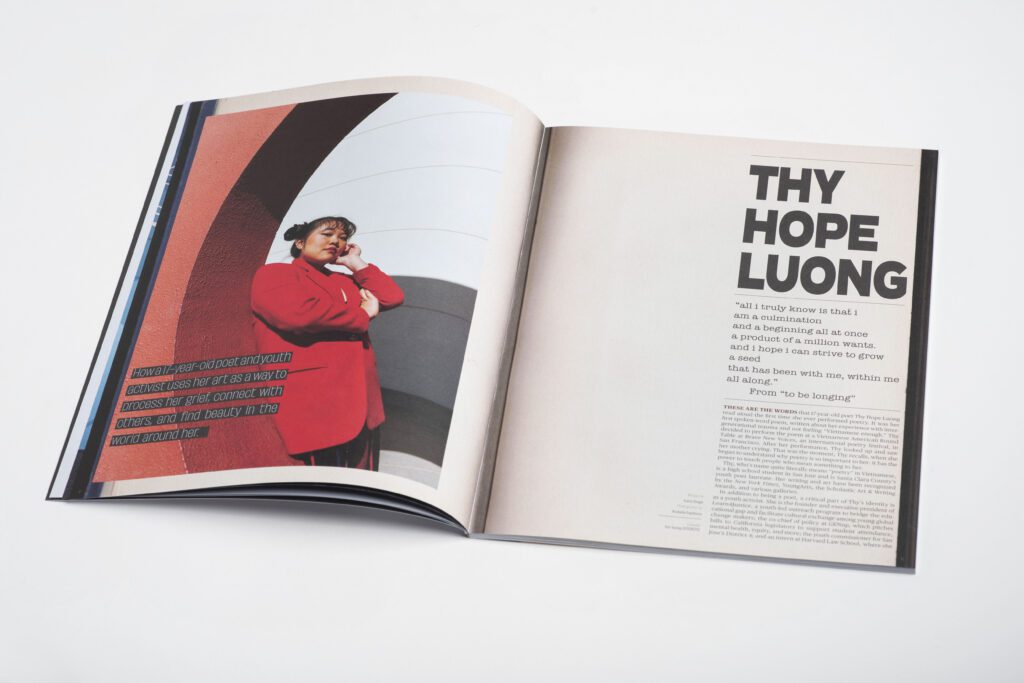
These are the words that 17-year-old poet Thy Hope Luong read aloud the first time she ever performed poetry. It was her first spoken-word poem, written about her experience with intergenerational trauma and not feeling “Vietnamese enough.” Thy decided to perform the poem at a Vietnamese American Round Table at Brave New Voices, an international poetry festival, in San Francisco. After her performance, Thy looked up and saw her mother crying. That was the moment, Thy recalls, when she began to understand why poetry is so important to her: it has the power to touch people who mean something to her.
Thy, who’s name quite literally means “poetry” in Vietnamese, is a high school student in San Jose and is Santa Clara County’s youth poet laureate. Her writing and art have been recognized by the New York Times, YoungArts, the Scholastic Art & Writing Awards, and various galleries.
In addition to being a poet, a critical part of Thy’s identity is as a youth activist. She is the founder and executive president of Learn4Justice, a youth-led outreach program to bridge the educational gap and facilitate cultural exchange among young global change makers; the co-chief of policy at GENup, which pitches bills to California legislators to support student attendance, mental health, equity, and more; the youth commissioner for San Jose’s District 4; and an intern at Harvard Law School, where she researched and tracked rhetoric and campaign strategies of conservative candidates for the 2024 presidential election.
“all i truly know is that i am a culmination and a beginning all at once a product of a million wants. and i hope i can strive to grow a seed that has been with me, within me all along.” -From “to be longing”
Thy’s exposure to poetry started young— her father is also a poet. Although she initially looked down at poetry as a form of expression that was “pretentious and inaccessible,” she has come to view it as a way to deal with and process the world. To Thy, poetry and activism are inextricably linked, two forces that work together to create more meaning. “Art is inherently an act of resistance,” Thy said. “It is useless, and that is the point. There is such beauty in creating something simply for the sake of creating. There is a reason why oppressive regimes crush art during resistance. Both poetry and activism create community and connection, which works against individualist forces like capitalism.”
Thy is so passionate about social activism because she recognizes the power of young people’s voices, as well as the potential for their words to be manipulated or misconstrued when they let someone speak on their behalf. Thy points out that the voices of young people are often tokenized, especially for political benefit. She claims, “Our voices deserve equal standing. So many issues affect us, and it is important that we find our way into decision-making spaces.”
To Thy, poetry, much like activism, is not an art that needs to be created and performed individually. Her deepest motivation in continuing her art is other youth and the lessons she has learned from her peers. She believes in the power of collaboration as a way to create new meanings and understandings of the world. One such act of collaboration was a group poem that Thy wrote alongside three other youth poet laureates—Matthew Kim, Sage Cobb, and Emma Zhang—for Santa Clara County’s State of the County Address on January 25, 2024. “If safety is home, / And home is you and me, / I find refuge in you,” they wrote in “Home.”
Thy also draws inspiration from Ocean Vuong, a Vietnamese American poet who shares his experiences with queerness, loss, love, and heartbreak in novels such as On Earth We’re Briefly Gorgeous and poems like “Someday I’ll Love Ocean Vuong.” Similarly to the deep introspection and evaluation of childhood that Ocean explores in these works, Thy’s poetry has explored a loss that occurred before she was born, but that nonetheless left a deep and indelible mark on her family and her place in it—the death of her older sister very soon after she was born. “I think of her often, alive, and wonder what it’d be like to be the younger sibling, to not pave the way. It would have clashed with my independence, I think. Or it would have unraveled me, in the sense that everything I am is premised only by my sister’s death,” Thy writes in her poem “White Lies.”
Just as poetry has been a way to connect with, process, and acknowledge her own trauma and pain, poetry is also one of the deepest sources of beauty in Thy’s life. “One thing that I have learned is that creation is so important,” Thy said. “Don’t just consume, create.”
Instagram: ThyHopeLuong

